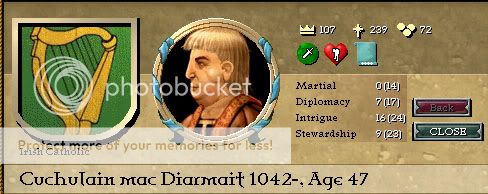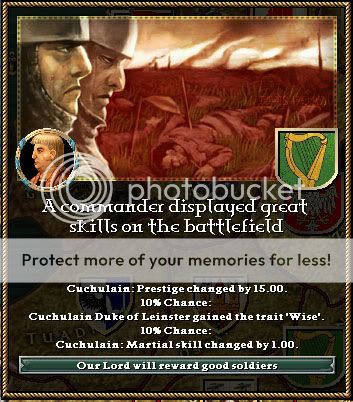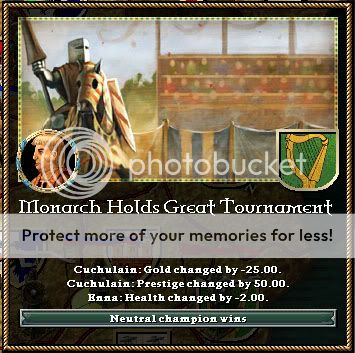It was once told to me that William the Norman, when asked what he thought of Ireland after his ascention in London-Towne, said, "'Ne'er have I seen a greater hive of scum and villiany than that wreched island called Eire." I cannot say if he truly said that or not, but if he did it's the only thing ever said by an English monarch that I would agree with.
Ireland is a vile place, where the noblest of us are usurpers, murderers, or worse. Every noble that rules on this island has a list of sins to their name so black as to stain you forever if you were to see them written down. They say that the devil himself once took the form of an Irish Duke, but left in shame when he realized that he could not match the wickedness of the other Irish Dukes. Aye, Ireland's the worst mankind has to offer, and I'm the vilest that this isle has spawned in a good many years. I'm a hunchback, a liar, and I'm rumored to be a kinslayer- though that last one has never been proven. They say I steal from any I meet, and that the only people I view as equals are criminals, thugs, rapists, and bandits- in other words, the other nobles of Ireland. They also say I deserve more than any other to be king and master of this God-forsaken land, 'cause I'm at least honest about what I am. I don't put much stock in what others say about me, but I do agree that this land would be best off ere I were to become it's King. My name is Cuchulain mac Diarmiat, and this is my story.
1067-1071: An Auspicious Beginning
Cuchulain was quickly able to establish alliances with Munster and Ulster after his ascention, sealing deals with both of them before January closed. Cuchulain began sending out feelers to the rest of the island, directed by a man named Imchad who served the Duke of Leinster as his spymaster. Imchad was an older fellow, though, and found the strain placed upon him by his new liege too much. Old age claimed Imchad in April of 1067. Following the death of old Imchad, the spymaster duties went through a quick succession of people.
A promising young lass by the name of Catriona was quickly promoted to replace the old spymaster days after his death. She served only a few months, though, before Duke mac Diarmiat allowed the girl to accept a promising marriage to Count Waltheof of Northhampton. Her successor was the extremely talented Bebinn, but she lasted only a month before she was wed to the brother of Duke Ailill of Munster as a sign of good will. While Cuchulain hated to see a girl as talented as Bebinn go, he considered it worth it to cement his ties to Munster.
Growing tired of constantly replacing his spymasters, Cuchulain promoted a less talented (but male) courtier by the name of Cormac to the position of spymaster. Cuchulain had little confidence in the man's skill as a spy, but he also had little fear that the man would be able to organize a coup under his nose. He gave strong consideration to a few more promising female candidates for the position, but ultimately decided that discretion was the better part of wisdom. Cuchulain traded talent for reliability and controllability, and made due with the lot God had given him.
1068 began promisingly enough with the birth of his first child. Cuchulain, always eager to exploit any situation for political purpose, further honored his neighbor to the west by naming his first-born Ailill. However, in June of that year, people reported a rash of evil omens across Leinster. Cuchulain was not a particularly pious person himself, but he did believe in the Church. Religious authorities were turned to to explain the meaning of these ill auguries, and they in turn proclaimed that they foretold doom for the House of mac Diarmait unless they granted God's instrument on Earth greater power in Laigin. Cuchulain cursed himself for having let himself fall into the churchmen's trap, though he did admire their cunning as he came to realize that it was Church officials that had organized the bad omens in the first place. Cuchulain reluctantly allowed the Church to expand it's authority over the other stands of society, realizing that he was no longer in a position to prevent them from doing so.
Cuchulain retreated to lick his wounds, and contemplate the murder of his cousin, the Duke of the Western Isles. Cuchulain stood fourth in the line of succession for that throne, and was eager to see his holdings expand. The sad fact was, however, that Cuchulain simply lacked the money needed to properly murder someone. Cuchulain was forced to bide his time, and hope that things improved.
Cuchulain kept to himself for the rest of the year, and became active again in Island politics only after the snows in Leinster began to melt in the waning days of winter in 1069. Cuchulain reciecved word from his neighbor to the north, the Duke of Meath, that he had completed a wonderous marvel. Cuchulain was intrigued by the notion of a hall of learning modeled after the idea (if not the form) of the Great Library of Alexandria. Cuchulain was eager to see this wonder, but could not leave owing to the advanced state of pregnancy his wife was in.
Cuchulain was rewarded for his fidelity in staying with his wife with another son on March 23rd. Cuchulain named this second child Onegus, after his own father. Only a short time passed after the birth of Onegus before Bronwyn was pregnant again. On March the 9th in the year of our Lord 1070, Cuchulain's third son was born. Cuchulain named this young man Lochlainn.
About the time of Lochlainn's birth, Cuchulain was contacted by his ally in Ulster. It seems that the old Duke had unearthed some claims his family had in days gone by to the County of Mayo. He asked if the mac Diarmiat clan had any similar claim. Cuchulain said that they did, and quickly forged documents that showed a legitimate claim upon the county of Sligo. Many thought that these claims were dubious at best, but the forgeries were so skillful that none could truly disprove them. Leinster and Ulster bid their time, waiting for a moment to strike.
August of 1070 saw ar break out between Meath to the north and Deheubarth to the east in Wales. One of Cuchulain's cousins was a courtier in Wales, and Cuchulain prayed that his cousin would die, thus moving a potential obstacle to Leinster's inheritance of the Western Isles. Though Meath was successful, Cuchulain's cousin (a man named Enna mac Diarmiat) survived. Surprisingly, though, Enna sought safety in Cuchulain's court. The Duke of Leinster gave some thought to killing the man outright, but decided that a bird in hand was a much better thing to have. Cuchulain arranged for Enna to marry a lovely but barren woman, and kept him in Leinster in order to keep an eye on him.
1070 ended well in Leinster, with new farming techniques being developed by a particularly intelligent group of pesants and the general prosperity of Laigin growing due to the expansion of the towns and hamlets of the county. This good fortune spilt over into 1071, when Connacht went to war against Cuchulain's cousins in the Western Isles. Cuchulain and Ulster both sensed opportunity. Claiming that they were coming to the defense of the mac Diarmiat clan, Ulster and Leinster launched into a war against Connacht.
1071-1075: The Northern War
The drums and pipes of war were sounded in Ulster and Leinster as soon as the echoes of those same calls faded away from the hills of Connacht. Armies were quickly raised, and both Leinster and Ulster raced forward to sieze land from the vassals of the Duke of Connacht. Naturally, Connacht was less than amused.
Connacht's only ally was Meath, but they were locked in a war against the Welsh Duke whose land they sought to steal, as well as the Welshman's allies from the distant continent. Meath was in no position to help Connacht, and so decided not to aid his ally. meath decried the partitioning of Connacht, but beyond words offered no support. Connacht was all alone.
Cuchulain, while marching north, realized how much easier going to war would be were their flat and even surfaces to march on. Scholars would later agree that this was the moment the ideas of roads reached Ireland. Cuchulain was in no position to act upon his insight, however, as he had a war to fight. Ulster's sizable force fell on Mayo like locust, while Leinster's much smaller army marched on Sligo. Connacht quickly broke off his attacks on the Western Isles, and returned to Eire to face his enemies at home. Munster siezed the chance to profit from the war by laying siege to Connacht's capital. Meath was quickly joined by the Western Isles. Realizing the Leinster's army in Sligo was the smallest of his three enemies, Connacht decided to focus there. Battle began on the 1st of August, 1071.
Leinster was heavily outnumbered, but her troops were of a much higher quality than were found in Connacht. Cuchulain was able to hold his own until Ulster was able to reinforce and drive off the Connacht counter-attack. The assistance did force Ulster to end her siege of Mayo, however. Victory was claimed by the allied forces of Ulster and Leinster on the 23rd of August. The joy of victory was quickly dampened, however, by news from Laigin. A tear-stained letter from Bronwyn informed Cuchulain that their son Lochlainn had died the crib death. Further news came from the east the next day, when Cuchulain learned that Meath had successfully concluded it's war and was possibly in a position to intervene now. Disturbed by both pieces of information, Cuchulain decided that his only option was still to press on with the siege.
Ulster returned to Mayo to press her claim again. Leinster, battered and bruised, was left to press the siege of Sligo alone. Connacht took advantage of the situation to attack a second time. While Cuchulain was able to drive off this second attack, his army was too devistated to continue the siege. Stubbornly (and foolishly), though, Cuchulainn decided to press on futilly with the siege, hoping that Ulster would be able to take Mayo quickly enough to allow Leinster to takie hold of her prize.
1072 was a foul year for all involved in the war. Connacht was weakened greatly, but still struggled to throw off her attackers. Leinster and Ulster's sieges bogged down due to repeted guerilla attacks from Connacht as well as through attrition and desertion. Cuchulain's son Onegus fell ill in February, and his gerenal malaise worstened into pneumonia in April. Cuchulain feared he was being ounished by a cruel and hateful God for some unknown wrong.
January of 1073 saw a young noble by the name of Poul join Cuchulain's court. Poul was the scion of an old noble line that had long held claims on the county of Mayo. Cuchulain welcomed the lad, thinking that he would be able to hold the boy in reserve should he be forced to give up his current gambit for failure.
That failure came sooner that Cuchulain expected. Connacht launched another raid against Leinster in March. Cuchulain acquitted himself very well, but his army was just too atrophied and finally broke.
Cuchulain consoled himself by hosting a tournament that June. The event was won by a bright young Irish lad from Meath, which further disheartened the Duke of Leinster. One bright piece of news did lighen the Duke's mood, though- his cousin Enna had been badly hurt in the joust and probably would never make a full recovery. that piece of news made Cuchulain laugh, though he was sure to keep his mirth about that to himself.
Cuchulain decided to fight dirty, and funded a revolt in Connacht. His treachery was repaid when Laigin went into rebellion as well, the people there tired of the long, costly, and unproductive war. Cuchulain realized that he had to end the feud, so he made peace with Mayo and arranged for a white peace with Connacht. The white peace let Cuchulain keep his claims on Sligo.




























